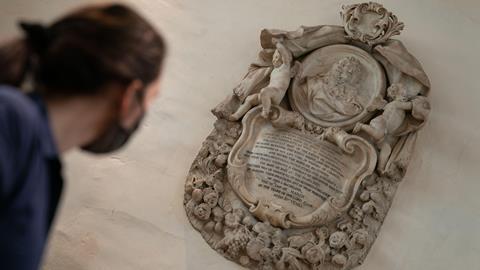A Cambridge college which unsuccessfully applied through court to have a controversial memorial removed has been spared a costs order.
David Hodge QC, Deputy Chancellor of the Diocese of Ely, sitting in The Rustat Memorial, Jesus College, Cambridge, Re (Costs) said the application was made ‘entirely properly’ and that the courts were the right place to determine such an important matter.
The college had petitioned to remove the memorial to Tobias Rustat (pictured above), a courtier to King Charles II, investor in the Royal African Company and benefactor to the university. The application gained widespread media attention as part of the more general debate around the retention of statues and memorials.
The judge in the Consistory Court of the Diocese of Ely ruled in March that the college had not made out its case to have the memorial relocated and said it was an ‘object lesson in the potential dangers of failing to undertake robust, inclusive research’ about an item of heritage.
Lawyers representing opponents to the application asked for their £42,300 costs to be covered by the college on the basis it behaved ‘unreasonably at every stage’. It was pointed out that the college’s solicitors admitted it had been an ‘uphill struggle’ and submitted that there was no attempt to engage in negotiations.
The opponents argued that the college misled students and fellows about the source of Rustat’s gifts to the university and gave a ‘false picture’ about Rustat to those people whose concerns it claimed to represent.
It was stated that the college had posted a rejection of the judgment on its website, and submitted that it was ‘wholly unreasonable and improper to use such a public space’ to question the ruling. Lawyers for the opponents accused the college of an attempt to ‘smear’ their behaviour.
The college opposed a costs order, saying the application was not dismissed summarily but only after a thorough consideration of the evidence. It denied creating a false narrative about Rustat’s involvement with the slave trade.
The judge set out that a party to faculty proceedings, whether a petitioner or a party opponent, would only be ordered to pay another party’s costs if they had behaved unreasonably in the conduct of proceedings.
He said this was a ‘paradigm example of a significant item of contested heritage’ which properly became the subject of consistory court proceedings.
He added: ‘It is highly unlikely that the parties to these faculty proceedings could ever have reached any accommodation that would have been acceptable to them all because the difference of opinion on the removal of the Rustat memorial was totally unbridgeable, and there was no realistic prospect of ever achieving any satisfactory compromise.’
This article is now closed for comment.




























10 Readers' comments